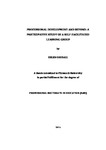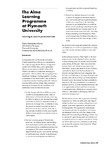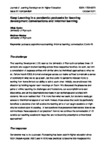Professional development and beyond: a participative study of a self-facilitated learning group
| dc.contributor.supervisor | Pratt, Nick | |
| dc.contributor.author | Goodall, Helen | |
| dc.contributor.other | Plymouth Institute of Education | en_US |
| dc.date.accessioned | 2015-07-15T15:02:18Z | |
| dc.date.available | 2015-07-15T15:02:18Z | |
| dc.date.issued | 2015 | |
| dc.identifier | 10320455 | en_US |
| dc.identifier.uri | http://hdl.handle.net/10026.1/3428 | |
| dc.description | The participative methodology employed for this research may be of interest to those not necessarily interested in the research subject itself. | en_US |
| dc.description.abstract |
This is a participative case study of a self-facilitating, collaborative, women’s learning group. The group’s longevity afforded a unique opportunity to investigate, in depth, both what encouraged its members to join at its outset, and what has sustained the participation of its current members for thirteen years. Its longevity also provided an opportunity to explore the impact of sustained membership on the women in the group. These two components of the study are its most significant original contributions to the existing literature which does not appear to cover anything similar. The initial raison d’étre of the group was its members’ professional development and this forms a central strand of the investigation, along with identity and self-facilitation. A pragmatic research paradigm, the collaborative nature of the group and the writer’s dual role as both participant and researcher were all influential in the decision to use a participative approach. A range of methods, chosen by the participants, was utilised during the investigation which, whilst participatory, is not emancipatory research. This experimental divergence from how a participative approach is traditionally employed is offered for consideration by researchers who wish to work in a new way that minimises power in other, non-emancipatory situations. The findings support, contradict and add to the literature. The mutuality of longevity and the depth of discourse and learning experienced by group members is a particularly striking aspect of this study. As members of the group have aged, its focus has segued from professional development to encompass a much broader agenda: it has shifted from contributing to members’ professional identity to sustaining their perceptions of self as women who remain capable of complex, critical thinking as they move out of full-time work. The longevity of the group has also fostered deep attachments between group members, despite the differences between them: sustained membership of the group, in turn, provides sustenance for its members. The significance of grounding, ground rules and group composition are highlighted, as is the need to contemplate how members will leave a group during its formation. Alignment between participants in a group is identified as important for its continuation but not always possible. This research makes no claim to offer a definitive model for collaborative learning groups but, instead poses a series of questions for consideration by others who are interested in collaborative learning. | en_US |
| dc.description.sponsorship | University of St Mark & St John | en_US |
| dc.language.iso | en | en_US |
| dc.publisher | Plymouth University | en_US |
| dc.subject | Self-facilitated learning | en_US |
| dc.subject | Professional learning | en_US |
| dc.subject | Personal and professional development | en_US |
| dc.subject | Collaborative learning | en_US |
| dc.subject | Sustaining learning groups | en_US |
| dc.subject | Learning in groups | en_US |
| dc.title | Professional development and beyond: a participative study of a self-facilitated learning group | en_US |
| dc.type | Thesis | |
| plymouth.version | Full version | en_US |
| dc.identifier.doi | http://dx.doi.org/10.24382/3623 | |
| dc.identifier.doi | http://dx.doi.org/10.24382/3623 |
Files in this item
This item appears in the following Collection(s)
-
01 Research Theses Main Collection
Research Theses Main




